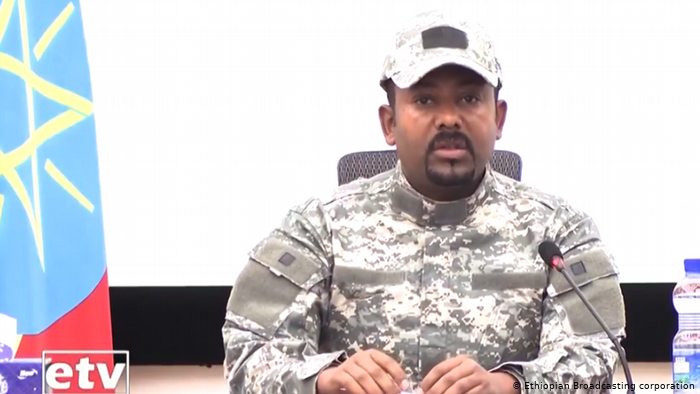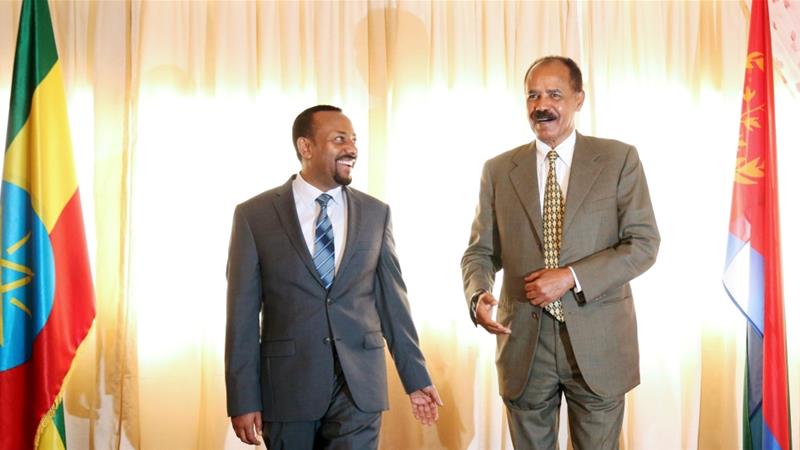By Faisal A. Roble
Within two years since he became the Prime Minister of Ethiopia, Dr. Abiy Ahmed appears to have lost the support of his Oromo core constituency. The recent arrests of prominent Oromo leaders and intellectuals (Jawar Mohamed and Dr. Bekale Garba and others) as well as the reported resignation of Lemma Megarsa from the post of Minister of Defense does not bode well for the future of Dr. Abiy.

Early signs of his downward slide to the abys is marked by his abrupt and less thoughtful response to his critic who challenged his maltreatment of the Oromo question: “If they cut my flesh, they would find out that the blood in me is pure Oromo” emotionally said Abiy. Such a tantrum and personalized response from a Prime Minister of 110 million country is emblematic of his desperation to win back the Oromo masses.
As his critics allege, the Prime Minister’s thinning political muscle is attributed to his “Medemer” (in Amharic, synergy in unity) philosophy which seeks to minimize the prominence of ethnic diversity as a legitimate and logical tool to resolve historical injustices in Ethiopia. Instead, Dr. Abiy prefers to create a new Ethiopia where Ethnic sentiments are whipped out, thus closing safe spaces for ethnic groups to navigate, are closed in favor of creating a single-story Ethiopia (read Chimamanda Adichie’s accounts on the dangers of a single-story narrative).
In many ways, Dr. Abiy is travelling a similar route traveled by the likes of Mao Zedong and Kim El-Sung, or even Mengistu Haile Marriam. These autocrats tried to replace objective historical narratives with ample safe spaces for their respective groups in their countries with their own socially engineered single-story narrative. To his premature demise, Dr. Abiy is doing the same.
If not a pie in the sky, it is a monumental task to reimagine or sustain in its archaic shape the Ethiopian empire or what some critics call the Menelik project, the only empire in sub-Sahar Africa. That is where he lost track and begun a fast-paced down spiral to the abyss in a short period of time.
Reforming Ethiopia has not been an easy task. Since emperor Haile Selassie proclaimed an imperial constitution in 1931, which revised the medieval rule of Fetha Negast, and in 1955 to modernize its parliament to annex Eritrea, subsequent administrations with different ideologies tried to reform the empire but to no avail; Mengistu Haile Mariam tried his own version of socialism under Ethiopia Tikdom; Meles Zenawi tried to establish a Tigran oligarchy in the name of federalism. In both cases, the empire, and the people inside it were massacred and subjected to genocide in the case of Somalis.
Dr. Abiy is one of a long line of rulers trying to reimagine the empire, only this time with his peculiar philosophy called “Medemer,” which embraced imperial history and symbols of oppression, his critics argue, without consulting or giving due respect to competing viewpoints presented by those conquered. Like his predecessors, he violently violated a federal constitution that he had inherited for the sole aim of extending his rule.
If any, “Medemer” has exposed Dr. Abiy’s fragility and hastened the waning of his influence within his own Oromo or other nationalities. Intellectually, he fumbled when he blamed Ethiopia’s political ills on imported concepts such as class struggle, regional, ethnic, or gender divisions. Without these foreign concepts, argues Dr. Abiy, Ethiopian peoples are one family.
One encounters in “medemer” lines very similar to 18th century’s Henri de Saint-Simo’s Utopian philosophy – even naiver than that. Dr. Abiy wishes away societal raptures that existed since the inception of the empire. In so doing, he negates established social science theories by arguing that without imported western philosophies, Ethiopia would have been a one family entity.
Such a naive believe and distorted world outlook led him to try to coerce Oromo, Somali, or other politicians in the regions to abandon their age-old political questions in favor of reviving a single idyllic but unattainable “one Ethiopian narrative.”
Akin to the late Maputo Sese Sseko’s Authenticity philosophy, Abiy’s “Medemer” purports to replace western philosophy with an “Ethiopianist philosophy.” By Western philosophy, he means the use of class struggle, identity consciousness, gender, and regional issues. He therefore negates the need for safe spaces for different social groups to navigate both as groups and as individuals.
Inspired by his mother’s dream that Abiy is the “7th Negus,” he takes his role in Ethiopian politics as a messianic assignment. Any force that stands in the way of such a celestial arrival of the “7th Negus” is doomed to burn in hail or in Ethiopian prisons.
Losing Global Support
As the news about the current political crisis spreads, Dr. Abiy is losing the admiration and adulation that led him to receive the Nobel Prize for Peace. Many of the Non-Profit groups and opinion makers that had lobbied on his behave have abandoned him. The International Crisis Group, Amnesty International, and Human Rights Watch have all assess his autocratic rule with unkind eyes.
Also, most of Arab nations who were initially infatuated with his first year in office and kindly opened their thick wallets reportedly are leaving his circle. The squabble over the utilization of the Nile water by Ethiopia and Egypt do not help. The conflict over the Nile does not help either. As to the Western, they unofficially abandoned him. Neither does his racist comments about Black and Jews in the era of George Floyd help.
In a recent interview that Ambassador Shinn gave to Aljazeera, he stated that the US is not happy about the autocratic trend the country is taking under Dr. Abiy. Served as the US Ambassador to Ethiopian between 1996 and 1999, Ambassador Shinn is a keen observer of the politics of the Horn of Africa.

Then there is the Isaias Afwerki factor. President Afwerki’s success to be sitting on the front driver’s seat in the affairs of Ethiopia is a sign to show that Dr. Abiy’s government is a failed state. In other words, when the very country that has been seeking your demise is your protectorate, it is obvious how precarious the rule of Dr. Abiy is.
Writing on and listening to Ethiopians in the diaspora with keen interest in the last 30 years, many, more so Amharas in the diaspora, see President Afwerki as the eternal enemy of their country, no matter what shape Ethiopia takes. That is, whether Ethiopia is a federal, democratic, or authoritarian state, Afwerki is still their enemy, this group believes. After all, he seceded two ports (Meswa and Asab) from “the motherland,” they argue, and rendered this110 the country a virtual landlocked. They see no room for forgiveness.
Arresting and allegedly beating the most prominent and political dissident of the Amhara extraction, Lidatu Ayalow, following the arrests of Jawar Mohamed and Dr. Bakale Garba, is tantamount to pouring benzene into a blazing fire. Neither does reported Eritrean commands in Addis Ababa and Adama cool off the political temperature.
One may wonder, therefore, why Dr. Abiy is not distancing himself from Afwerki. Pragmatic politics dictates him to not create an enemy out of Afwerki. But at the same time friending his is a huge liability.
President Afwerki is neither a friend nor a foe to any political leader in the Horn of Africa region, and more so to Ethiopia. In the eyes of many Ethiopians, Afwerki is the devil that you do not want to be with or against. To borrow what the late Dr. Ali Mazrui said about the complex influence of the Buganda tribe in Uganda’s politics, that “ you can’t rule Uganda with or without the Buganda,” one can say about Afwerik’s factor in Ethiopian politics. Dr. Abiy cannot rule Ethiopia with or without Afwerki. Because of that, Abiy is a hostage to Afwerki whether he recognizes it or not.
Without securing the support of Oromo and other ethnic groups plus the dicey Afwerki factor, tough days are ahead of Dr. Abiy. Some even predict that his reign may not last long. His weakening of the power grip is hastened by naked ploy to framing and arresting opposition groups for trumped up treason crimes, when what they did is nothing but carrying out peaceful political activities, and that symbolizes the beginning of a rough road that leads to hell.
Faisal A. Robleu
Email: faisalroble19@gmail.com
———–
Faisal Roble, a writer, political analyst and a former Editor-in-Chief of WardheerNews, is mainly interested in the Horn of Africa region. He is currently the Principal Planner for the City of Los Angeles in charge of Master Planning, Economic Development and Project Implementation Division

Leave a Reply